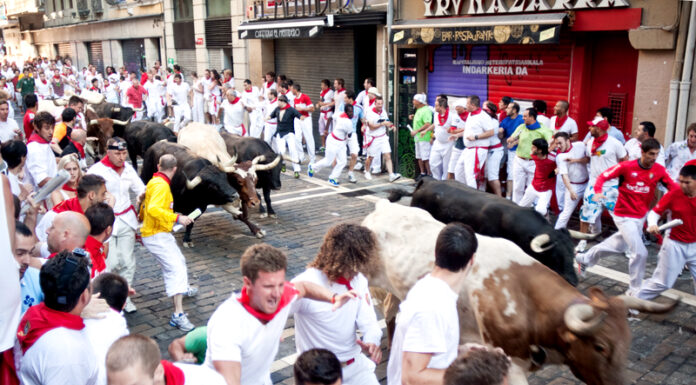A 20-year-old man died after being gored by a bull during a festival in El Casar, Spain, marking the second bull-related fatality in the town within a month. The incident has reignited debates about the safety and ethics of traditional bull-running events in the country.
The young man, whose name has not been released, was participating in a bull-running festival in El Casar, a town of 12,000 residents in the province of Guadalajara, Castille-La Mancha. The event was part of the town’s patron saint festivities on Saturday, September 7.
The tragedy unfolded in the town’s bullring when a bull charged at the victim, driving its horn into his chest and puncturing his lung. Emergency services were called immediately, and the man was initially taken to the University Hospital of Guadalajara in a mobile ICU. Due to the severity of his injuries, he was later transferred to the University Hospital of La Paz, where he ultimately succumbed to his wounds.
José Luis González Lamola, the mayor of El Casar, addressed the incident in a statement, saying, “We deeply regret the unfortunate accident that occurred during the bullfighting festivities during the patron saint festivities.” He added that flags outside municipal buildings would fly at half-mast and that black crepe would be placed on the flags located inside municipal buildings. All official public events organized by the El Casar council were canceled for mourning period.
This fatal goring comes just weeks after another bull-related death in the same town. In late August, a 51-year-old man died during a bull run in Mesones, a district of El Casar, when he slipped on a fence while trying to escape from the bulls.
These incidents contribute to a grim statistic: since record-keeping began in the 20th century, 16 people have died during Spanish bull runs. While such fatalities are relatively rare, they highlight the inherent dangers of these traditional events.
Bull-running festivals, deeply rooted in Spanish culture, have long been a source of controversy. Supporters view them as an important cultural tradition, while critics argue that they pose unnecessary risks to both humans and animals.
The Running of the Bulls in Pamplona, part of the San Fermín festival, is perhaps the most famous of these events. It attracts over a million spectators and approximately 20,000 participants annually. However, even this well-organized event has seen its share of tragedy, with 15 deaths recorded since 1910 and the most recent fatality occurring in 2009.
The recent deaths in El Casar have intensified calls from animal rights groups for a comprehensive ban on bull-running events. The Animal Defence Association of El Casar expressed solidarity with the families of both recent victims and questioned the organization of such bullfighting shows.
A spokesperson for the association stated, “Beyond the legal issues, these incidents generate expenses and consequences that affect all citizens, even those who oppose these events. The pain for this new victim is deep and part of our fight consists of preventing tragedies like this from continuing to occur.”
Animal rights organizations like PETA have long campaigned against bull-running festivals and bullfighting in Spain. They argue that these events cause unnecessary suffering to the bulls and pose significant risks to human participants. PETA Latino has been particularly active in condemning the Running of the Bulls festival in Pamplona, urging supporters to take action against the event and calling for its end.
Despite the protests and growing concerns, bull-running events continue to attract both locals and tourists. Many participants view the runs as a test of courage and a connection to Spanish cultural heritage.
Safety measures at bull-running events vary, but even well-organized festivals like the one in Pamplona cannot eliminate all dangers. Injuries are common, ranging from minor scrapes to severe gorings. Medical services are typically on hand to respond to emergencies, but as the recent incidents show, some injuries prove fatal despite prompt medical attention.
The debate over the future of bull-running in Spain is likely to intensify in the wake of these latest deaths. While some regions of Spain have already banned bullfighting, it remains popular in others. The campaign “#NoEsMiCultura” (It’s Not My Culture) aims to repeal the law designating bullfighting as “cultural heritage” and empower communities to prohibit the practice.








